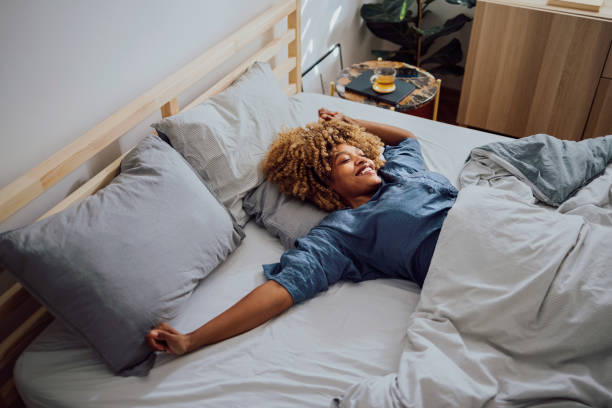Making changes to your diet and lifestyle may help improve your sleep quality. Certain supplements and natural remedies could also be beneficial.

A good night’s sleep is just as important for your health as regular exercise and a healthy diet.
ResearchTrusted Source shows that poor sleep can have a negative effect on your thinking ability, mood, heart health, immune health, and more. It can also increase your chances of developing obesity and diabetes, among other health conditions.
For this reason, getting a good night’s sleep is one of the most important things you can do to optimize your health.
Here are 15 evidence-based tips to help you sleep better at night.
1. Increase bright light exposure during the day
Spending time in natural sunlight or bright light during the day can helpTrusted Source keep your circadian rhythm healthy and, in turn, improve your daytime energy and nighttime sleep quality and duration.

The results of a small 2022 studyTrusted Source suggest that daytime bright light exposure can improve sleep quality and duration. For this reason, it’s a good idea to get daily sunlight exposure or, if that’s not possible for you, to invest in an artificial bright light device or bulbs.
An earlier 2017 studyTrusted Source of more than 100 office workers found that those who were exposed to a lot of light in the morning had less time to fall asleep at night, especially in winter. They also found better synchronization of the body’s internal clock and an improved quality of sleep.
2. Reduce blue light exposure in the evening
Nighttime light exposure can have the opposite effect from daytime exposure because it reduces your levels of some hormones — including melatonin, which helps you relax and get deep sleep.

Blue light, which electronic devices like smartphones and computers give off in large amounts, is the worst type in this regard.
There are several popular methods you can use to reduce nighttime blue light exposure. These include wearing glasses that block blue light and turning off the TV, other devices, and any bright lights 2 hours before bed.
3. Don’t consume caffeine late in the day
A single dose of caffeine can enhance focus, energy, and sports performance. However, the authors of a 2023 research review found that late caffeine consumption reduced total sleep time by 45 minutes and overall sleep efficiency by 7%.
/https://cms-prod.s3-sgn09.fptcloud.com/caffeine_la_gi_nhung_cong_dung_cua_caffeine_ma_co_the_ban_chua_biet_1_ca990a2312.jpg)
This may be because caffeine may have a negative effectTrusted Source on REM sleep, though the research on daytime caffeine consumption and sleep isn’t conclusiveTrusted Source.
To be safe, it’s a good idea to avoid drinking caffeinated beverages at least 8 hours before bedtime. And if you’re taking a caffeine supplement, don’t take it within 13 hours of bedtime.
If you find yourself craving a cup of coffee in the late afternoon or evening, stick with decaffeinated coffee.
4. Reduce irregular or long daytime naps
While short power naps can be beneficial, taking long or irregular naps during the day can negatively affect your nighttime sleep.
Sleeping in the daytime can confuse your internal clock, meaning that you may have a hard timeTrusted Source falling asleep at night.

But the effects of napping vary from person to person. For example, a 2021 reviewTrusted Source suggests that napping might be helpful for people who are athletes or engage in strenuous physical activity and might not compromise their nighttime sleep quality.
If you take regular daytime naps and sleep well, you shouldn’t worry. But if they seem to be disrupting your nighttime sleep, consider cutting them shorter or limiting them.
5. Try to sleep and wake at consistent times
Your body’s circadian rhythm functions on a set loop, aligning itself with sunrise and sunset. That’s why being consistent with your sleep and waking times can aid long-term sleep quality.
A 2020 review of 41 studies found that going to bed late or having an irregular sleep pattern negatively affected sleep quality.

If you have trouble sleeping, try to get into the habit of waking up and going to bed at similar times every day. After several weeks, you might not even need an alarm.
6. Take a melatonin supplement
Melatonin is a key sleep hormone that tells your brain when it’s time to relax and head to bed. Melatonin supplements are an extremely popular sleep aid and may help youTrusted Source fall asleep faster.
The Food and Drug Administration (FDA) doesn’t classify melatonin as a drug, which means that, as with other supplements, the FDA does not regulate its quality or dosage. However, research studies have looked at doses of 0.1 to 10 milligrams (mg) up to 2 hours before bedtime.
You can start with a low dose and work your way up. But before trying melatonin supplements, it’s a good idea to check with a healthcare professional. Always talk with a healthcare professional if you’re thinking about using melatonin as a sleep aid for your child. Long-term use of this supplement in children has not been well studiedTrusted Source.
7. Consider these other supplements
Several supplements may help you relax and go to sleep, including:
magnesium
nitrate
omega-3
resveratrol
zinc

While these supplements are not a magic bullet for sleep issues, they can be useful when combined with other strategies. Make sure to try these supplements one at a time to test their effects on your sleep and to make sure you don’t have a negative reaction.
8. Don’t drink alcohol
Having a couple of drinks at night can negatively affect your sleep and hormone levels.

This is because alcohol is known to cause or increaseTrusted Source the symptoms of sleep apnea, snoring, and disrupted sleep patterns. It also changes nighttime melatonin production, which plays a key role in your body’s circadian rhythm.
While an occasional drink at dinner or when you’re out in the evening isn’t likely to be harmful, consider avoiding drinking alcohol too close to bedtime on most nights.
